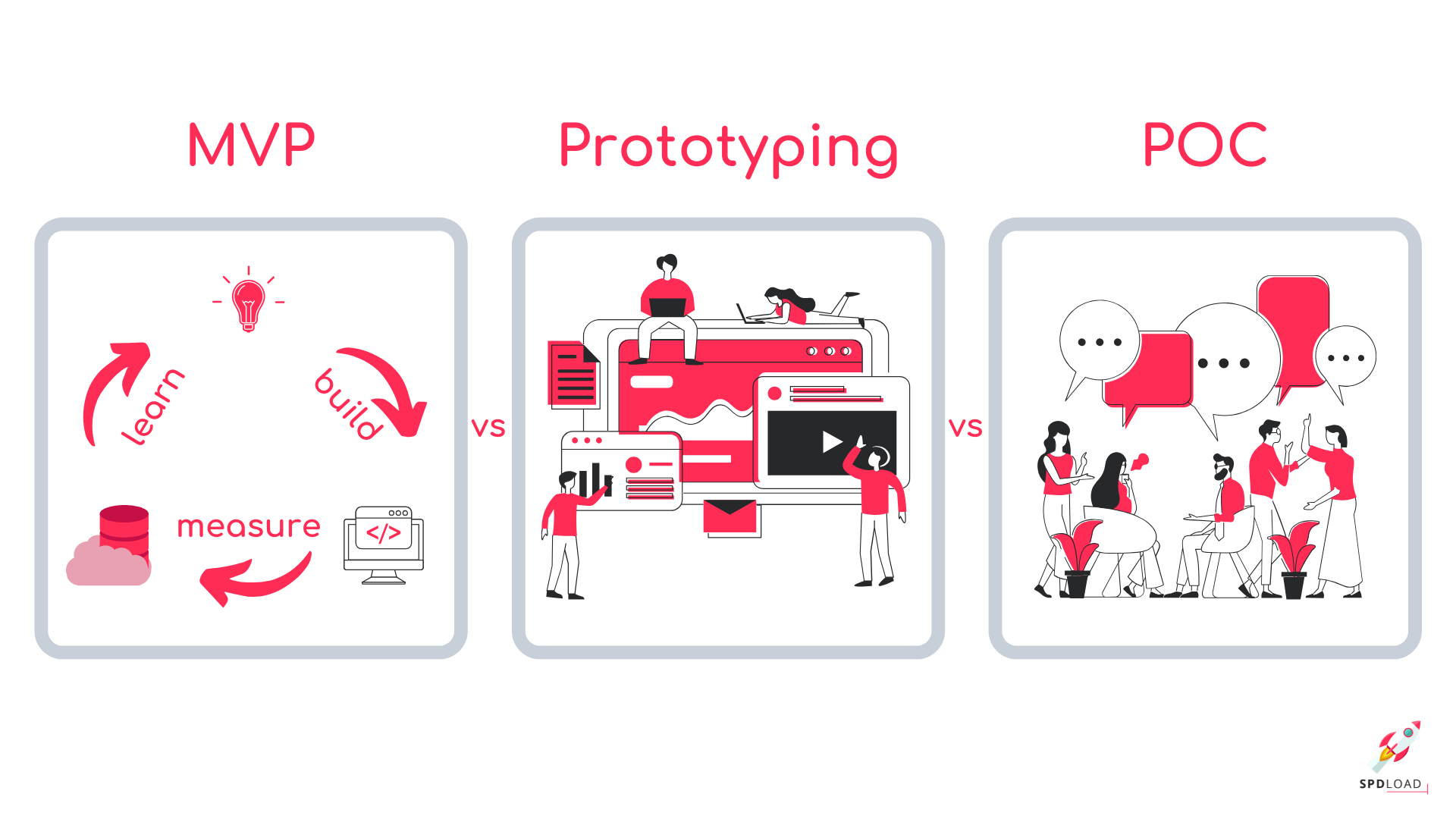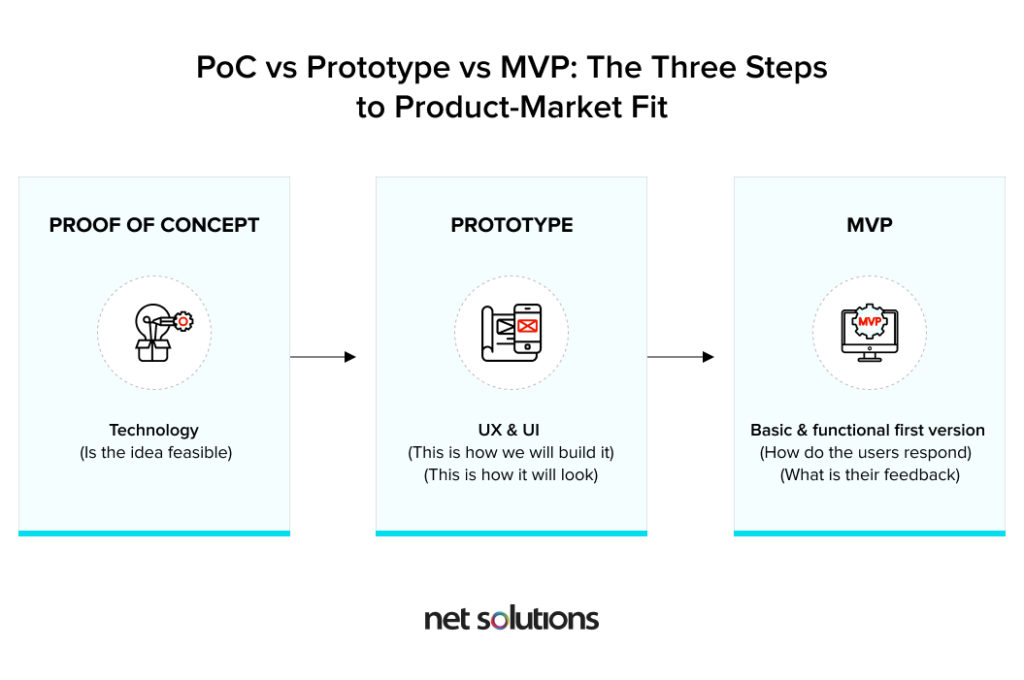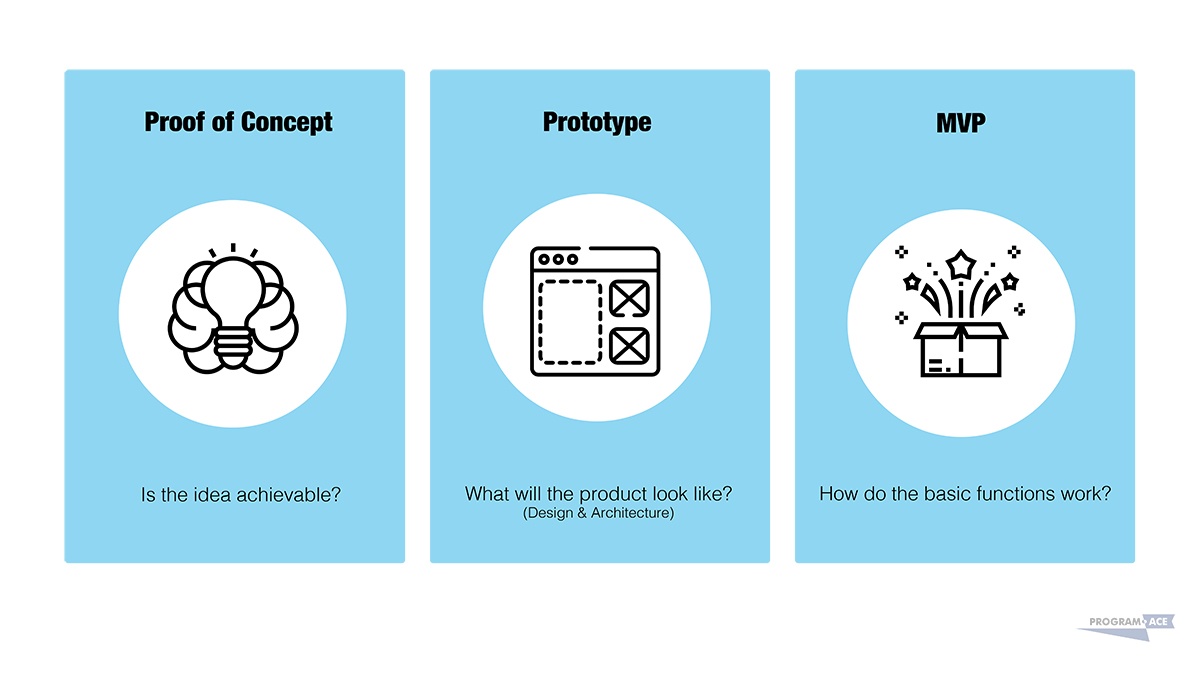- Proof of Concept (POC)
Approach: Is the idea feasible?
Implementation: Developing a POC is the quickest and most accurate way to validate or invalidate assumptions about your target users and app concept.
Mobile App Prototype
Approach: How will this product function?
Implementation: Mobile app prototyping is a form of user research to validate the strategic design direction of a product. A prototype is a preliminary visualization of a working product. Prototypes build an understanding of the mobile app’s look and feel, which helps test how customers use and react to the overall user experience (UX) design. Using a prototype for usability testing gives you enough time to make changes to critical design issues before the product reaches development and it’s too late (and too expensive) to make major changes to the UX.
Minimum Viable Product (MVP)
Approach: What are the product’s core functionalities and value proposition?
Implementation: A mobile app MVP is a minimal and usable form of your complete product to release and test in the app market. The MVP development method allows your team to learn how the product’s target users experience and respond to the app’s core business purpose. Using the insight and learnings from real users, you can allocate your time, effort and budget to areas that best satisfy your overall business objectives. Building an MVP is an iterative process designed to identify user pain points and determine the proper functionality to address those needs over time.
What is a POC?
A POC will provide a definitive “yes” or “no” answer; either the concept is viable or it’s not.
The POC approach to product validation is about demonstrating functionality and verifying whether a particular idea is feasible for development.
Even if a POC proves that the concept won’t work, it’s possible to find other solutions from the same starting point.
What is a Mobile App Prototype?
While a POC shows a product concept can be done, a mobile app prototype shows how it will be done.
The purpose of a prototype is to communicate a product’s design and navigation flow to maximize the efficiency of development. Prototyping is a valuable exercise which results in visualization of how the app will function by demonstrating user flows and depicting a working design and layout. Naturally, there will be errors in a prototype, but discovering these errors during the early stages of a project is one of the purposes of a prototype.
What is a Minimum Viable Product?
Prototypes often influence an MVP and the two work together to create a successful end product.
An MVP is a minimal form of your complete product that is tested in the market.
This approach to development allows you to learn how your users will react to your product before you waste a lot of money and resources building something no one wants or needs.
While prototypes solve problems during the early stages of development, an MVP’s iterative process is designed to identify users’ pain points when the product is actually tested in the market.
The risk of developing more (or less) than you need is why validating your product assumptions with an MVP is so important.
Starting with a core feature, learning how users react to that feature and building in accordance with user feedback is essential for determining the appropriate amount of functionality your product needs to acquire and retain users. Over time, the learnings that come from an MVP define your product roadmap and guide the evolution of your app.
An MVP is a version of a product that includes only the features it needs to be marketable. With the MVP process, you can verify the following:
Product viability
Product assumptions
Usability
Market demand
MVPs provide immediate value while minimizing development costs.
Ultimately, an MVP allows you to build a product with minimal features and iteratively build it out to create a better, more polished product while leveraging user intelligence to make the best decisions possible. With every release version, the product evolves to maximize ROI and move towards a fully mature application.
https://clearbridgemobile.com/beginners-guide-poc-vs-mvp-vs-prototype/
- What is the Difference Between MVP vs POC vs Prototype and why does it matter?
Factor:Role
POC
Is this concept even feasible? The POC can be used to validate assumptions about the idea.
Prototype:
How will the product or solution actually function?
MVP:
What is the value proposition of the product and how will it function?
Factor:Development
POC
Demonstrates that a solution could be built
Prototype:
Shows how the solution will be built and how it will work.
MVP:
Is a built version of the product that tests the market for it.
Factor:Audiences
POC
Tends to be rather small and used internally to showcase an idea.
Prototype:
Usually used internally to see how the development work will be carried out.
MVP:
Is used externally to gauge market interest and see how it could be improved.
Factor:Issues
Prototype:
Deals with issues at the early stage of development.
MVP:
Takes an iterative approach to development looking at issues the client has with the product when it is in the market.
Factor: Function
POC
Does not function as a fully working product.
Helps to understand whether it is feasible to go ahead with the product.
Prototype:
Does not function as a fully working product.
Helps to see how the product will look and how it will feel for the user.
MVP:
Functions fully as a working product using the basic but most essential functionality.
Helps to see how the product will be used.
Factor: Feedback
POC
Does not provide an opportunity for feedback from actual or possible customers. Might sometimes be used with investors to attract funding.
Prototype:
Can allow the firm to get feedback from a few possible customers.
MVP:
Allows the firm to gather feedback from a lot of customers, potentially.
Factor: Customer growth
POC
Does not grow the customer base.
Prototype:
Does not grow the customer base.
MVP:
Grows the customer base at the same time as iterative development is taking place.
Factor: Revenues
POC
Will not bring in revenues from customers.
Prototype:
Will not bring in revenues from customers.
MVP:
Can bring in revenues from customers.
https://enkonix.com/blog/mvp-vs-poc-vs-prototype/







